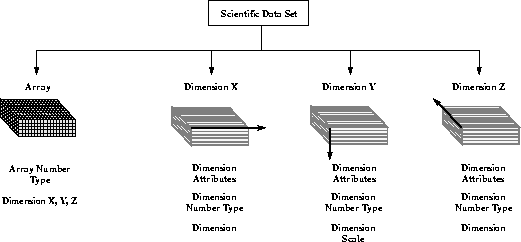

Descriptions of these objects are in Chapter 3, Scientific Data Sets (SD API).
12.2.1.1 Dimensions
Unlimited dimensions, supported in the multifile SD SDS model, aren't supported in the single-file DFSD SDS model. 12.2.2 Optional DFSD SDS Objects
There are two types of optional objects available for inclusion in an SDS: dimension scales and attributes. Optional objects are only created when specified by the calling program. 12.2.2.1 Dimension Scales
Conceptually, a dimension scale is a series of numbers placed along a dimension to demarcate intervals in a data set. They are assigned one per dimension. Structurally, each dimension scale is a one-dimensional array with size and name equal to its assigned dimension name and size. 12.2.2.2 Predefined Attributes
Predefined attributes are attributes that have reserved labels and in some cases predefined number types. They are described in Chapter 3, Scientific Data Sets (SD API).
12.3 The Single-File Scientific Data Set Interface
The HDF library currently contains several routines for storing scientific data sets in the HDF format. DFSDadddata, DFSDputdata, and DFSDgetdata perform data I/O and by default assume that all scientific data is uncompressed 32-bit floating-point data stored in row-major order. DFSD library routines also read and write subsets and slabs of data, set defaults, determine the number of data sets in a file, and inquire about or assigning reference numbers before reading or writing data. 12.3.1 DFSD Library Routines
The names of the C routines in the DFSD library are prefaced by "DFSD" and the names of the equivalent FORTRAN-77 functions are prefaced by "ds". They are categorized as follows:
DFSD library routines are more explicitly defined in Table A and on their respective pages in the HDF Reference Manual.
TABLE 12A - DFSD Library Routines